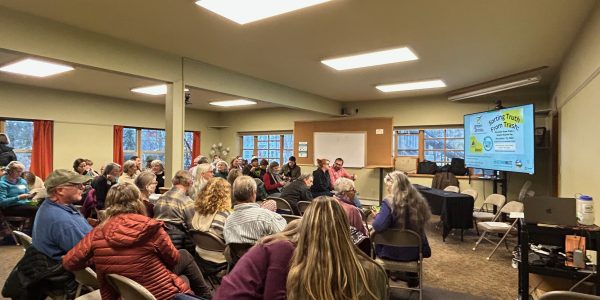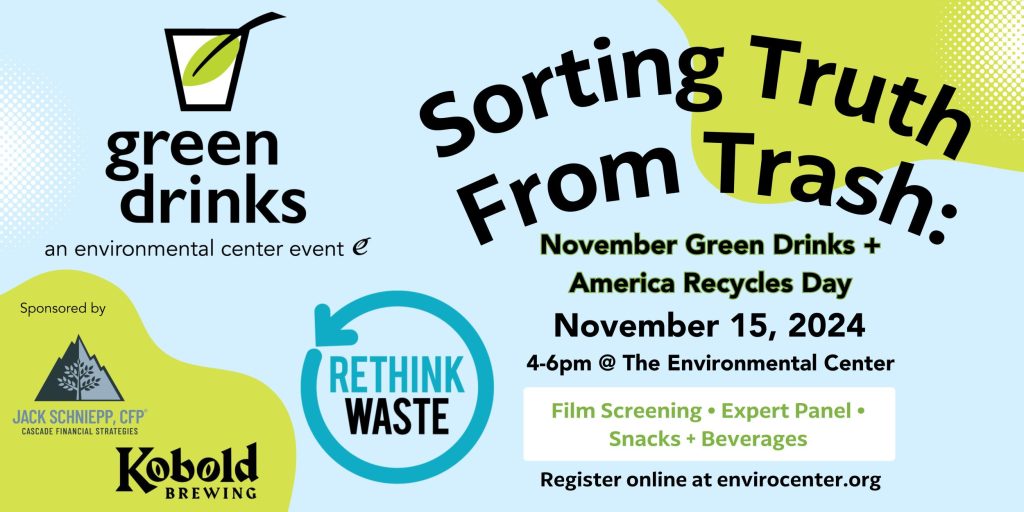Sorting Truth From Trash: A Green Drinks on America Recycles Day!

Earlier this fall, the California attorney general filed a lawsuit against ExxonMobil accusing the oil and gas giant of deceptively framing chemical recycling as the solution to our plastics crisis. The plastics industry has indeed spewed misinformation about the environmental impacts and viability of both traditional as well as advanced or “chemical” recycling to justify endless production of plastics. Plastics recycling, as well as recycling in general, is a complex and confusing topic, and our community here in Central Oregon has a lot of questions on the issue!
That’s why for America Recycles Day on November 15th, the Rethink Waste Program partnered with Green Drinks to hold an event connecting Central Oregonians to a panel of local recycling experts- we called it “Sorting Truth From Trash: A Green Drinks on America Recycles Day.”
The highlight of this event was a Q&A session with our panel of local experts:
- Tim Brownell – Director of Deschutes County Solid Waste
- Courtney Voss – Municipal Manager, Republic Services
- Colin Teem – Regional Specialist, Oregon DEQ (Department of Environmental Quality)
We’ve compiled the community questions below and a paraphrased, condensed version of the panelists’ answers. You can also watch the full recording of the event on Youtube.

Q&A with local recycling experts
1. Based on your background and current role in this space, what would you like the community to know about recycling?
When recycling programs were first starting, there was material sorting at the household level-meaning people had multiple bins for various materials, making it more straightforward to understand what could and could not be recycled locally. The process, locally and nationally, has shifted to a single-stream, or commingled, recycling model, in which materials are all mixed together at the curbside. This has been a big challenge for both individuals trying to figure out what they can recycle, and for the recycling industry as whole. Prior to the adoption of single-stream recycling, there was also more communication between waste haulers and households; for example, waste truck drivers used to provide feedback to households about misplaced materials. Now that there is only one bin, the haulers typically don’t check that materials were properly placed and households don’t get personalized feedback. So, what’s the path forward? Likely it will come down to improved technology and increased education. Another important note panelists want the community to understand is that recycling is not the solution to the problem of overconsumption, which is why we’re shifting the conversation to waste reduction (reduce, reuse), and looking at the upstream impacts of consumption, not just the downstream ones typically associated with waste management.
2. “Wishful recycling” is when we throw something in the recycling bin hoping it will be recycled, but we aren’t sure if it’s actually recyclable. Can you talk a bit about why it’s important folks are not wishful recyclers?
Commingled recycling in your curbside bin is taken to a Commingled Recycling Processing Facility (CRPFs, formerly called Materials Recovery Facilities), where materials are sorted and shipped to end markets. When the wrong materials end up at these facilities, they need to be manually removed, requiring a lot of labor and time. Contaminants like plastic film and bags clog up the machinery and slow down the process. When in doubt, throw it out, even if you wish it could be recycled.
3. What happens to our recycling once the truck takes it from our curbs?
The truck takes your recycling to a facility in Bend where it is baled and shipped to Commingled Recycling Processing Facilities (CRPF) in Portland. There, it is sorted and processed by individual material types, then shipped again to a third facility or end market where it can be made into something new. It’s a pretty energy intensive and expensive process, which is why we say recycling is important but it isn’t the solution to the problem.
4. What level of oversight is there to ensure that our curbside recycling is actually being responsibly recycled? Who provides the oversight?
The Recycling Modernization Act (RMA), legislation passed in 2021, will come fully into effect in July 2025, and it mandates stricter oversight of recycling. Oregon Department of Environmental Quality (DEQ) and Producer Responsibility Organizations (PRO) will provide monitoring and oversight of the Commingled Recycling Processing Facilities (CRPFs) and Responsible End Markets (REMS). There has been a lack of oversight in the past, which is part of what the RMA changes will address. Currently, our recycling system is paid for in full by municipalities and households, but with the RMA there will be additional funding coming from the producers (those creating packaging and materials). Producers will share the cost of recycling and they’ll pay more if their product can’t be recycled– part of this increased funding will be used for monitoring and oversight.
5. How does the Recycling Modernization Act (RMA) impact things from your position and what are you most excited about?
Deschutes County is not currently meeting its goal of recovering (through recycling and compost) 45% of waste generated- and funding is part of the problem. Funding could support increased education about what can and cannot be recycled, as well as infrastructure updates. For example, Deschutes County Solid Waste hopes to build a local recycling facility within the county that would serve Central and Eastern Oregon, rather than relying on facilities in Portland. The RMA will bring significant funding from manufacturers and producers to the community to help meet these needs.
6. What are other places doing differently that have less contamination in their recycling-does it just come down to education?
Right now, about ten percent of commingled recycling that we in Central Oregon are sending to CRPFs gets landfilled due to contamination. Some places in the U.S. with lower contamination rates have better education at the curb, and that’s something we [local waste haulers] have not done well. For instance, when truck drivers see there’s the wrong item in the cart, we should be letting the customer know through cart tags, phone calls, etc. Outside of education, it’s also important to evaluate all the local streams of waste and think about what is recoverable (food waste, construction, etc.).
7. With a lot of construction going on in Central Oregon, have there been any attempts to reach out to the bigger builders about managing the associated waste?
Thirty-eight to forty percent of all materials disposed of in Deschutes County are from construction-related activities. To put that into perspective, the national average is about twenty percent. So yes, construction waste is a big concern here. The County is looking into building a facility specifically for directing and sorting construction debris, with the hope of recovery a significant percentage of the waste. It’s estimated that at least half of that material should be recoverable. We also want to develop financial incentives for developers to sort materials either on site or bring them to County Solid Waste facilities.
8. Is there anything we can do with our food waste that can go somewhere better than landfill?
If you have a yard debris bin, you can put all food scraps, even dairy and meat, in there. It will be composted at Knott Landfill, keeping it out of the landfill and creating rich soil. If you don’t have a yard waste bin, you can add one through a monthly subscription service.
9. Why can’t we put “compostable” packaging and paper products in curbside compost/yard waste bins?
Products and packaging are able to have a “compostable” label if they can be broken down in a lab into organic materials. In reality, these products don’t decompose at the rate that our compost systems are working. It takes perfect conditions for those “compostable” utensils to actually break down, so there ends up being little bits of plastic and packaging in the soil made from the compost if we put these items in there.
10. There’s a lot of styrofoam in packaging and from local construction, what can be done with that?
Right now, there’s no way for us to recover styrofoam locally, but the RMA will change that. After July 2025, you’ll be able to drop-off styrofoam at designated sites to be recycled. However, styrofoam, like many other plastics, can only be what’s called “downcycled,” which means it can only be recycled once. The product that it’s recycled into will not be recyclable.
11. Right now in Central Oregon, yard debris/compost bins are a subscription service that you need to opt into and pay for. Has Republic Services thought about giving everyone a yard waste bin for free?
Republic Service is not willing to give free yard waste bins to everyone, but we’re happy to work on increasing their accessibility by, for instance, providing them to folks that can’t afford them. One thing the City of Bend is considering as part of their Climate Action Plan is having universal collection for yard debris- this wouldn’t make the yard bins “free”, but it would be automatically bundled with your recycling and landfill bins.
12. Have you thought about creating a food recovery program to go to food insecure folks in the community?
We’re working on some food recovery initiatives with Neighbor Impact and High Desert Food and Farm Alliance, so more to come on that. There’s a lot of good work related to this going on in Central Oregon.
13. What are Deschutes County Solid Waste, the waste collectors, and DEQ doing to educate people on what can and can’t be recycled?
The RMA requires regional and local jurisdictions and waste haulers use part of the RMA-generated funding for customer-facing outreach and education, so this will be ramping up after July 2025.
14. Are we going to have e-garbage trucks?
We have our first electric garbage truck running today in Bend! There will also be AI technologies on e-garbage trucks to identify contaminants in recycling.
15. We know plastics have negative impacts on human health in addition to the environment, so when plastics are recycled, are the waste and fumes from that process released into the environment? Are those byproducts toxic too?
Maybe… there are groups like Beyond Plastics and Break Free from Plastics doing research on the public health and environmental impacts of recycled plastics. We don’t have a good understanding of this issue, it hasn’t been well-researched.
16. What’s going on with the thick plastic grocery bags after a plastic ban on single use plastic bags?
The thick plastic grocery bags meet the “reusable” standard of being able to be used 25 times. We’re not sure where they will be able to be recycled. These products will be regulated under the RMA.
17. If there’s one place to go to for information about what to do with your waste, where should I go?
Rethink Waste Project has a guide online and in paper form. Also, Cascade Disposal has a handy app with an AI wizard that will look at a photo of a product and tell you if it is recyclable locally.
Another huge thank you to our panelists. While we covered a lot during this session – from details of the Recycling Modernization Act to construction waste and recycling contamination – we unfortunately did not have time to get to everyone’s questions.
The Rethink Waste Project is always open to community questions related to consumption, waste reduction, recycling, etc. Please email me at naomi@envirocenter.org with any waste-related inquiries!
Naomi Serio
Rethink Waste Program Coordinator